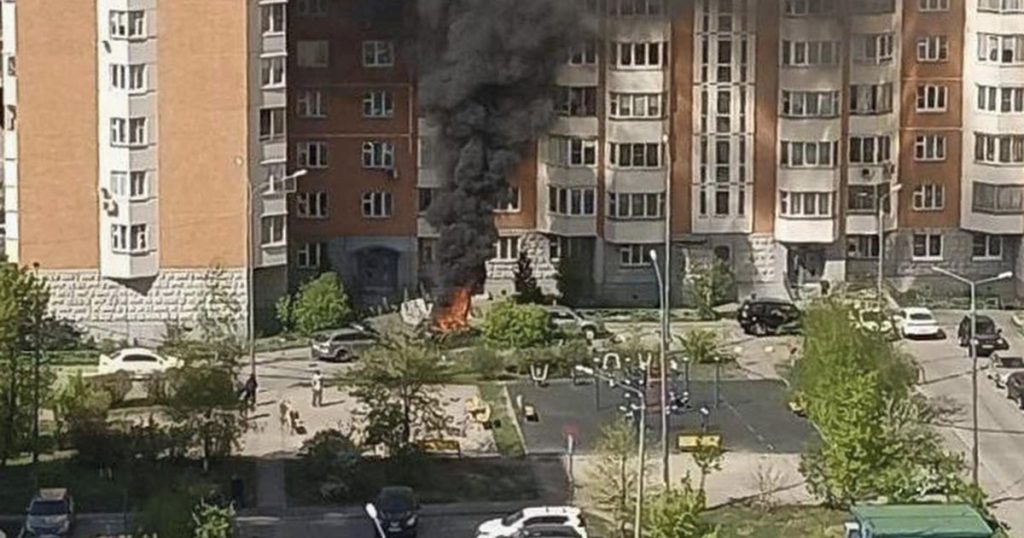A devastating explosion in Balashikha, near Moscow, resulted in the death of General-lieutenant Yaroslav Moskalik, the deputy head of the military’s main operational directorate. Authorities have initiated a murder investigation following the detonation of an explosive device concealed in a parked vehicle, which has led to speculations surrounding the target’s connection to ongoing geopolitical tensions. This incident is part of a troubling trend of attacks against Russian officials linked to military operations in Ukraine, raising concerns about security and political stability in the region.
| Article Subheadings |
|---|
| 1) Overview of the Incident |
| 2) Background on General Yaroslav Moskalik |
| 3) Investigation and Response |
| 4) Previous Attacks and Context |
| 5) Implications for Russian Security |
Overview of the Incident
On Friday, April 25, 2025, an explosive device detonated in a parked car, resulting in a significant blast that claimed the life of General-lieutenant Yaroslav Moskalik. The explosion occurred outside a residential block in Balashikha, which is situated just east of Moscow. The Investigative Committee, responsible for probing major crimes, has since asserted that they are investigating the incident as a murder committed through the use of explosives. Images circulating on social media depicted flames and destruction, heightening concerns over public safety and security in urban areas.
Background on General Yaroslav Moskalik
General Yaroslav Moskalik held a prominent position as the deputy head of the military’s main operational directorate, a role that placed him at the center of Russia’s military strategy. Official records indicate that he was appointed as a general-lieutenant by President Vladimir Putin in 2021. Notably, Moskalik was involved in international discussions, serving as a military representative during the 2015 “Normandy format” talks related to the Ukraine conflict, signaling his significance within the military hierarchy. Reports suggest he resided in Balashikha, although the vehicle he was using at the time of the explosion was not registered in his name.
Investigation and Response
The Investigative Committee has launched an inquiry into the circumstances surrounding the explosion. Preliminary findings indicate that the blast was caused by an improvised explosive device (IED), designed to cause maximum harm through the deployment of metal fragments. Security camera footage revealed a massive explosion moments before someone approached the vehicle, raising questions about possible surveillance and premeditation involved in the attack. The authorities are now examining all leads to identify those responsible for the bombing, including the potential smuggling of explosives and links to previous incidents.
Previous Attacks and Context
The attack on General Moskalik is the latest in a series of targeted operations against Russian military personnel, reflecting the ongoing conflict in Ukraine. Prior incidents include the high-profile killing of nationalist Darya Dugina in August 2022 and the assassination of military correspondent Maxim Fomin in a café explosion in April 2023, both of which prompted widespread speculation regarding Ukrainian involvement. While Ukrainian officials had previously claimed responsibility for certain attacks, there has been no direct attribution for Moskalik’s assassination, leaving room for various theories about the motives and perpetrators behind the bombing.
Implications for Russian Security
This assassination raises significant questions about the safety of Russian military officials and the overall security situation in the country. Following a series of high-profile attacks, including the killing of Igor Kirillov in December 2023, President Putin has acknowledged the failures of his security apparatus. He emphasized the need to prevent such “serious blunders” from occurring again, reflecting an acknowledgment of vulnerabilities within the Russian military structure. The incident underscores a contrasting narrative within Russia, as officials navigate both external threats and potential internal unrest exacerbated by the ongoing conflict in Ukraine.
| No. | Key Points |
|---|---|
| 1 | General-lieutenant Yaroslav Moskalik was killed in an explosion in Balashikha, near Moscow. |
| 2 | The Investigative Committee has opened a murder probe and is examining the use of an improvised explosive device. |
| 3 | Moskalik was a high-ranking official involved in military strategies and peace talks related to Ukraine. |
| 4 | The attack adds to a series of targeted hits on Russian military personnel that may be tied to the ongoing conflict in Ukraine. |
| 5 | President Putin has publicly acknowledged the security risks posed to military officials following these attacks. |
Summary
The assassination of General-lieutenant Yaroslav Moskalik highlights the increasingly perilous environment for Russian military personnel in the wake of ongoing geopolitical conflicts. This incident reflects broader security challenges faced by Russia and raises alarm over the efficacy of protective measures surrounding military officials. As investigations continue and political implications unfold, the situation will likely attract further scrutiny both domestically and internationally.
Frequently Asked Questions
Question: Who was General Yaroslav Moskalik?
General-lieutenant Yaroslav Moskalik was a high-ranking official in the Russian military, serving as the deputy head of the main operational directorate. He had a significant role in military strategies and represented Russia in international peace talks concerning Ukraine.
Question: What caused the explosion that killed General Moskalik?
The explosion that killed General Moskalik was caused by an improvised explosive device (IED) planted in a parked vehicle. The device was designed to maximize harm, utilizing metal fragments to inflict damage upon detonation.
Question: What are the broader implications of this assassination for Russian security?
This assassination underscores the vulnerabilities faced by Russian military officials amidst ongoing conflicts. It raises concerns over the effectiveness of the country’s security measures and highlights the existing risks in political and military spheres, prompting President Putin to call for improvements in security protocols.


